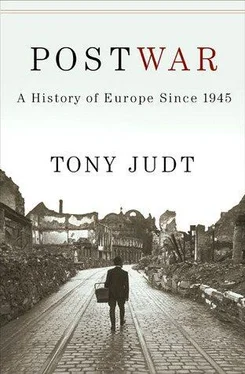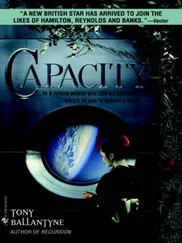The EU was not alone in subsidizing its own farmers to the detriment of others. It was not even the worst offender: Norway, Switzerland, Japan and the US all pay out more in per capita terms. But the EU appeared somehow more hypocritical. While Brussels preaches virtue to the world at large, its own practice is often quite selective. East Europeans, instructed to incorporate and adopt a veritable library of European Union regulations, could hardly fail to notice the frequency with which West European governments exempted themselves from those same rules.
In 1995, according to a UNICEF study, one British child in five lived in poverty, compared with one in ten in Germany and one in twenty in Denmark.
Invoking slightly different criteria to make a similar point, the Cambridge political theorist John Dunn divides the workforces of wealthy countries into ‘those who can individually take very good care of themselves on the market…, those who can hold their own only because they belong to surviving units of collective action with a threat advantage out of all proportion to the value of individual members’ labour, and those who are already going under, because no one would chose to pay much for their labour’. Dunn, The Cunning of Unreason. Making Sense of Politics (London, 2000), p. 333.
Gorz, as befitted a man of his time and politics, assumed that this new class would in turn fuel a new generation of radical social movements. To date there is little evidence of this.
In 1992 alone, the Federal Republic opened its doors to nearly a quarter of a million Yugoslav refugees. Britain admitted 4,000; France just 1,000.
At the end of the twentieth century there were an estimated 5 million Gypsies in Europe: some 50,000 in Poland, 60,000 in Albania, half a million in Hungary, perhaps 600,000 each in Bulgaria, the former Yugoslavia and the Czech Republic and at least 2 million in Romania. The prejudice and abuse to which they were exposed was common to every country in which the Gypsies lived (not to mention places like Britain to which they were forbidden entry).
The Dansk Folkeparti originated in a breakaway from the Danish Progress Party, itself a product of the anti-tax movements of the early 1970s (see Chapter 14) but considered by a new generation of radicals to be too ‘soft’ on the EU and insufficiently anti-immigrant.
In Switzerland, where anti-immigrant prejudice was especially widespread in the German-speaking cantons, the racism was not always buried: one election poster showed an array of dark-skinned faces over the caption ‘The Swiss are becoming Negroes’.
With one exception: Edith Cresson—a former French Socialist Prime Minister turned EU Commissioner—contributed to the discrediting of the whole Commission when it was revealed in 1999 that she had used her power in Brussels to invent a well-paid consultancy for her former dentist.
Even taking into account the Yugoslav wars of the Nineties, the number of war-related deaths in Europe in the second half of the century was less than one million.
Raymond Aron (born in 1905) shared some of Zweig’s wistful memories, if not his despair: ‘Ever since, under a July sun, bourgeois Europe entered the century of wars, men have lost control of their history’.
Many Poles, it should be noted, also insist upon their country’s place at the centre of Europe—a revealing confusion.
Much the same is true of Albanian Kosovars. Liberated by NATO from Serbian oppression, they aspire to independent statehood less from nationalistic ambition than as a surety against the risk of being left in Serbia—and out of Europe.
Anna Reid, Borderland. A Journey through the history of Ukraine (2000), p. 20. Hence the place of ‘Europe’ in the language and hopes of the Ukrainian revolution of December 2004.
See Tony Judt, ‘Romania: Bottom of the Heap’, New York Review , November 1st 2001.
As the common language of many tens of millions of people in the Americas, from Santiago to San Francisco, the international standing of Spanish was nevertheless secure. The same was true of Portuguese, at least in its quite distinctive Brazilian form.
With the exception of Romania, where the situation was reversed and French had by far the broader constituency.
The exception in this case is Bulgaria, where Russia and its language had always found a more sympathetic reception.
Respectively the French, German and Italian flagship expresses.
In June 2004 the present author received the following greeting from a correspondent in the foreign ministry in Zagreb: ‘Things here good. Croatia got EU membership invitation. This will change many mental maps’.
Hungarians in twenty-first-century Romania, Slovakia and Serbia were another, smaller post-imperial minority: once dominant, now vulnerable. In the Vojvodina region of northern Serbia, Hungarians who had lived there for centuries were periodically assaulted and their properties vandalized by Serb youths. The response of the authorities in Belgrade, who appeared to have learned nothing and forgotten nothing from the catastrophe of the Nineties, was depressingly predictable: the attacks were not ‘serious’ and in any case, ‘they’ started it.
Quite the opposite. In a series of measures in the spring and summer of 2004 the authorities significantly curtailed both the rights of the press and the already restricted opportunities for public protest. Russia’s brief window of freedom—actually disarray and the absence of constraint rather than genuine constitutionally protected liberty—was fast closing. In 2004, Russian observers estimated that KGB-TRAINED officials occupied one in four of civilian administrative posts in the country.
Including the domestic political calculations of Greek politicians, who for many years used their vote in Brussels to hinder and block any movement on Turkey’s candidacy.
In addition they were wont to see as ‘European’ an idealized free-market, contrasting it with the graft and cronyism of Turkey’s own economy.
The Christian Democratic Union in Germany was officially opposed to Turkey joining the EU.
Democratic Spain did indeed develop an official ‘heritage’ industry, fostered by its Patrimonio Nacional , but the latter took care to emphasize the country’s distant Golden Age rather than its recent history.
In T .R. Reid, The United States of Europe. The New Superpower and the End of American Supremacy (NY, 2004), p. 131.
Britain was not unique. In one week in September 2004 the Spanish national lottery, El Gordo , took in 5,920,293 euros.
Though not yet constrained by the American obligation to partner a white male (host) with a black male (sports), a white female (soft news/features) and a weather-person (colour/gender optional).
Читать дальше












